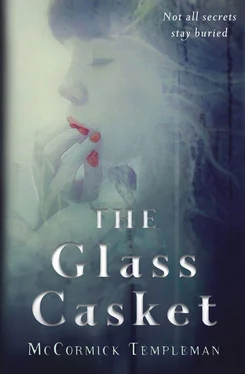Rowan thought about her cousin long after supper and was still thinking about her, up in her room, as she dressed for bed. She resented her father for preventing her from speaking with the girl. Fiona Eira was family, after all, and they were practically the same age. She might make for a good friend; although, looking at the girl today down by the well, Rowan wasn’t sure the two would have much in common.
She changed into her nightgown and turned down her bed. On her desk, beside the candelabra, sat the remainder of The Book of Widows . Perhaps just a little translating before bedtime would calm her. After lighting the candles, Rowan was gazing through the picture window and out into the woods beyond when she was overcome by a sudden chill. She felt almost exactly as if someone was watching her. She stood still a moment and nearly moved to blow out the candles, but then she decided she was being ridiculous. Shaking it off, she pulled out her chair and sat down. With the lush green lacquer of her desk smooth beneath her arms, she lost herself quickly in the motion of the pen over paper.
She did not stop until she was satisfied with her work, and when she laid down her pen, she looked out the window to see the nearly full moon stretching high into the sky. But just as she pushed her chair in, she thought she heard something outside her window. She froze, peering through the panes into the moonlight-dappled darkness beyond. Pema, who had been asleep under the desk, jumped onto Rowan’s bed, startling her.
“Pema, girl, you frightened me,” Rowan said, but she knew it was not Pema that had scared her. The dog curled up at the foot of the bed.
“You’re staying in here tonight, eh?” she said, petting the dog’s head. “I suppose Emily won’t mind.” Pema hadn’t heard the noise, Rowan told herself, and Pema could hear a northern squirrel scuttle up a pine from hundreds of yards away. Her mind was playing tricks on her, that was all. Nodding to herself, she climbed under the covers and blew out her candle. She lay there a moment, listening to her breath, until she could take it no longer. In a flash, she was up again and at her window. She drew down the curtains against the night, against the unknowable. Finally content, she climbed back into bed and drifted off to sleep.
FIONA EIRA COULDN’Tstop thinking about the boy in the square. When she’d looked up to see him, when her eyes had met his—it was as if something inside her had changed. There was a kindness to his face that she’d not often seen in young men, and when he’d laughed, it had awakened something in her, and she realized that their shared moment was the first time she’d laughed since her father had died. As she walked back home, she noticed that she still felt him with her, lingering in her mind’s eye.
She wanted to meet him, but she would need to discover his name without Seamus, her guardian, finding out. She knew she ought to be grateful to Seamus for providing for her and Lareina after her father’s death, but the truth was he made her nervous.
She walked on, concentrating on the ground beneath her feet, listening to the solid crunch of the snow and focusing on the scent of the rich oils of pine that lingered in the breeze. She filled her belly with air and softened her lungs, slowing the rate of her heart, which had crept ever steeper since thinking of her father.
Before he died, she had been a happy child, an uncomplicated girl. She loved her father and her stepmother almost as much as she loved swimming in the sea and playing chase with the village children. But when her father died, everything changed. Seamus Flint had shown up almost before the man’s body was cold, promising money and comfort, protection. Lareina had no family, after all, and had a girl to look after now—a girl who wasn’t even her own, he had said. How that had angered Fiona, for Lareina was her mother, if not by blood, then by spirit, and as Lareina often said, a woman need not birth a child to feel a mother’s love.
Before their journey to the mountains, Seamus had told them that they were leaving to be closer to Fiona’s family. He had intimated that her long-lost relatives would greet them eagerly and with open arms, but they had done no such thing. The scholar, her uncle, had turned them away with barely a word. And just now at the square, the look in her cousin’s eyes … she recognized it. Her cousin had been told not to speak to Fiona—that she was dangerous. But what dangers could she possibly present?
As Fiona walked the forest path back to her new home, her mind drifted to memories of her father. He had been a quiet man, a man not accustomed to showing affection, and yet he had been a good man, providing for her, always giving her a kind word when she was most in need. She missed her life by the sea—the warm winds and clear blue ocean swells.
Her heart ached when she thought about the morning walks she used to take with Lareina, their bare feet sinking into the sand still cool from the night. There, they would comb for seashells to string into necklaces that her father might sell at the weekly open market. In the afternoons, they would sit in the sand outside their cottage, the warm sun beating down on Fiona’s shoulders as they worked. Lareina made a habit of setting the loveliest necklace aside for Fiona. Fastening it around her neck and kissing her on the cheek, she would say, An ocean bloom for my ocean rose . Those necklaces were gone now too. In the end, Goi Flint had sold even those. The past year had been a dark one, but Fiona was beginning to suspect that things might be changing. Perhaps her gentle stranger, that solid, earthbound boy, augured the start of a new kind of happiness.
* * *
Lareina looked up from her sewing the second Fiona pushed her weight against the heavy wooden door. Setting down the needle and thread, she smiled at her stepdaughter.
“Hi, Mum,” Fiona said, and kissed her on the cheek. “You were worried, weren’t you?”
Lareina laughed and shook her head. Fiona’s eyes fell to the knitting needle on the hearth, and a heaviness settled over the girl’s face. Her mother, Malia, had died an agonizing death—sepsis—and the root of it had been the prick of a simple knitting needle. Such a small thing to destroy the lives of a woman and child.
When Lareina had first met the girl, she was barely a slip of a thing, ashen and traumatized, huddled by the hearth fire, in need of attention and serious grooming. She had been five, and it had been three months since her mother’s untimely death. Her black hair had run wild, and her large coal eyes had pockets of gray beneath them. To Lareina, she’d looked like a withered and grieving old soul trapped within the body of a child. Lareina’s first thought upon seeing Fiona was that she was somehow cursed—a witch’s spell gone awry. The girl had looked at her new stepmother with unseeing eyes, and Lareina, being not much more than a girl herself, and not knowing what she could possibly do to help the child, had sat beside her, removed a comb from her bag, and had begun the colossal task of untangling the child’s obsidian nest of hair.
Since that day, the two had engaged in this ritual whether or not Fiona’s hair was in need of combing, and so the girl, now nearly a woman, undid her braid and sat at her stepmother’s feet. Picking up the comb that lay beside her, Lareina lifted her stepdaughter’s hair and ran the fine ivory teeth through it with care while Fiona rested her cheek on her stepmother’s knee.
“How was the square?” Lareina asked, and the girl sighed.
“Fine, I suppose. Not much of interest, and no one will talk to me. They stare at me, though.”
Читать дальше












